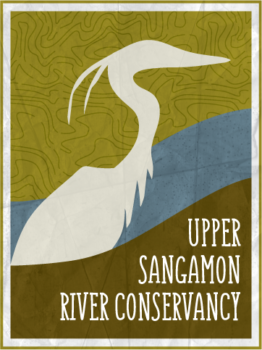Two-score and 14 years ago, my mother brought forth: me.
And its times like this that guys like me take time to stop and reflect. And today I’m reflecting on my river; looking back at seven things that living on the Sangamon River has taught me over the years.
- Life has its ups and downs
I’m writing this column instead of doing what I should be doing this Saturday: cleaning trash from the Sangamon River. Two days ago, the river measured a nice, respectable, and low 5.5 feet at the Fisher Gage. Perfect for Saturday’s scheduled river cleanup event. But heavy rains for the last two days raised the river level by nearly 8 feet, so the USRC postponed the clean up to next weekend (this coming Saturday, September 17). Join us!
This year we had to hold our Duck Race in the river’s floodplain instead of the river, and we’ve already canceled two mussel surveys due to high water. With the Sangamon River, it’s like a roller coaster, constantly up and down and back up again. And these ups and downs can wreak havoc on planned river events! Rivers are like life that way.
- Go with the flow
Our adaptability can be our greatest strength. This is particularly true given life’s ups and downs. The more time we spend fighting, the more exhausted and worn out we become. On the river, it’s impossible not to experience how much easier it is to go downstream than to go against the flow.
We need to give up resistance. On the river, if I stay between the banks and avoid oncoming obstacles before I get too close to them, I find that I just keep flowing pleasantly along with little effort. Life should be that easy.
- Slow down
I noted pleasantly that Mahomet just lowered speed limits in some areas to 25 mph. Slow down: always a good lesson. One of my favorite quotes was by a very youthful Sean Penn in Fast Times at Ridgemont High: “Don’t worry, the world’s round. We’ll get there.”
I can’t be in a hurry on a river either. Wristwatches are generally pointless. The nature of nature is that it moves at precisely the pace it wants to move. No faster because I’m in a hurry. The Sangamon flows just over 1 mile an hour, most of the time. And believe me, when I travel at that speed, I see way, way more than I ever imagined. And it was always right there. To see it, I just needed to slow down and look. So I need to slow down and make my goal the ride, not the destination.
- You never know what’s around the next bend.
Even here in the land of country roads stretching to the horizon so straight that you could set your compass by them, the rivers constantly twist and turn. So on a river, you can never see what’s around the next bend, beyond your line of sight; and this is a far truer reflection of reality. Too often we think we can see beyond what we can see and we can know things about the experiences of others that we don’t know (i.e. gays, Muslims, undocumented Mexican immigrants, Syrian refugees, Chicagoans). We should probably travel around that bend in the river and see what’s there before making assumptions.
- Cherish the moment.
The Sangamon teaches me that the only constant in a river is change. The river, once it passes the bottom of the steps that lead down to the river in my backyard, isn’t coming back. Every day brings something slightly different. Something new. Even if it’s just in a small, barely noticeable way. And all that I can really know of the river is what’s right there in my backyard, during the moment in time that it passes slowly by.
I can’t know what’s on the way downstream, and I can’t know what happens once it goes off around the gentle northwest bend just downriver from here. The river shows me that the future and the past don’t exist except in imagination and in memory. There is only now. I need to relish the now. Cherish the moment.
Silence can be deafening. And drifting silently with the current, down the river, things can get very quiet. And yet, the quieter it gets, the closer I listen; and the closer I listen, the more I hear.
Sometimes we ask whether a tree falling in a forest makes a sound if no-one is around to hear it. I find this to be an annoyingly human-centric question since in any given patch of forest there are hundreds if not thousands of other forest creatures and insects around to hear it. And they’re all listening, attuned to the sounds of the forest. I find that the more I listen, the more I hear and the more I learn. This is true whether in the forest, with my family or (particularly) when having political discussions with people I disagree with.
- I’ll always be there for you.
Like all natural features of our earth, rivers were here long before we got here and they will be here long after we’re gone. So for our entire short lives (relative to a river’s), the river will always be there for us. And whatever we try to do to it, the river will undoubtedly just keep on flowing.
Will I be there for my river? And will I always be there for others in my life? And the question for me is have I changed things for the better or for the worse for my having been there?
So far, it’s been a wondrous and exciting two score and 14. And I continue to wonder what other exciting lessons I have yet to learn.


